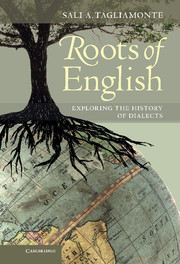Book contents
- Frontmatter
- Contents
- List of Figures
- List of Tables
- Preface
- Acknowledgements
- Abbreviations
- 1 Introduction
- 2 Dialects as a window on the past
- 3 The Roots Archive
- 4 Methods of analysis
- 5 Word endings
- 6 Joining sentences
- 7 Time, necessity and possession
- 8 Expressions
- 9 Comparative sociolinguistics
- 10 The legacy of British and Irish dialects
- Notes
- References
- Index
9 - Comparative sociolinguistics
Published online by Cambridge University Press: 05 November 2012
- Frontmatter
- Contents
- List of Figures
- List of Tables
- Preface
- Acknowledgements
- Abbreviations
- 1 Introduction
- 2 Dialects as a window on the past
- 3 The Roots Archive
- 4 Methods of analysis
- 5 Word endings
- 6 Joining sentences
- 7 Time, necessity and possession
- 8 Expressions
- 9 Comparative sociolinguistics
- 10 The legacy of British and Irish dialects
- Notes
- References
- Index
Summary
But I mean when you look at the time now and look at the times we had then, you could nae compare them.
(Rob Paisley, 78, CLB, 008)In this chapter, I take a step back from the individual linguistic analyses and consider the findings from an overarching perspective. All told, I have shown the results of twelve accountable variation analyses of linguistic features spanning morphology to discourse. Each of the linguistic features examined throughout the chapters has applied a specific set of methodological principles to the study of language variation and change. These include (1) accountability, (2) proportional analysis and (3) an analysis of constraints, i.e. patterns of use. Each study also offers a unique perspective – variable phenomena consistently studied across an array of related synchronic northern dialects. This type of analytic method fulfils the rigorous requirements held to be best practice in the comparative sociolinguistic enterprise, namely accountable analysis of distributions and constraint hierarchies across linguistically and socially related varieties. In addition, I have augmented the variation studies with a series of cursory comparisons of the most frequent words, expressions and verb forms in the data, all of which have peppered the excerpts, quips and stories interspersed throughout the text. Although comparative sociolinguistic interpretation can be complicated by numerous factors, social and otherwise, the broad perspective of mutually reinforcing data sets and consistently applied analysis go a long way towards offering a unified interpretation.
Rue the day!
Aye, she says I’ve a surprise for thou’. I says ‘oh aye, what sort of a surprise?’ She says, ‘I don’t know whether it’s a surprise or a shock.’ I says ‘what?’ she says, ‘oh Jackie’s changed car’. I says ‘is he getting Morris thousand then?’ she says ‘no’. I says, ‘what the hell’s he getting?’ she says ‘an (inc)’. I says ‘oh’. Talk about letting low down and that. I says, ‘thou’ll rue it’. And mind I said, ‘don’t come to me when thou do for changing a good car like for till that bloody thing’. Eh, it was a damn nuisance!
(Phil Stephenson, 84, MPT, 022)- Type
- Chapter
- Information
- Roots of EnglishExploring the History of Dialects, pp. 185 - 194Publisher: Cambridge University PressPrint publication year: 2012



